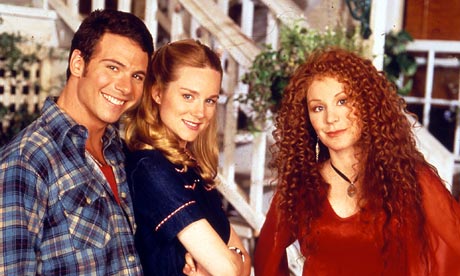
Back in 1993, something extraordinary happened on broadcast television. A mini-series based on Armistead Maupin's novel, Tales of the City was aired on PBS. Why is that so extraordinary? Well, to start, Tales started out as a daily column in a San Francisco newspaper in the mid-70s. Then it was collected in book form, a series that eventually spanned seven books. I think it's kind of amazing that a serialized newspaper column made such an engaging, and popular set of books.
More amazing is the fact that when it was finally brought to television, the timing was perfect for a flashback to 1970s San Francisco. 70s nostalgia was all the rage then, and the mini-series was spot-on. So what had once been a contemporary slice-of-life story had the added element of being a period piece.
Then there is the subject matter, a very frank take on sex, drugs, gay sex. . .all sort of taboo on broadcast television, let alone PBS. Even more incredibly, same-sex kissing, joint smoking, coke snorting, even nudity appear in the series, quite casually. As raunchy as it would seem on the surface, Tales has an oddly innocent feel to it. Of course, it still rather squicked out some tight asses, and PBS was forced to offer a censored version to their affiliates. Luckily for me, our station (WOSU Columbus, where I lived at the time) aired the uncensored version.
This came at a time in my life when I was teetering on the edge of big changes in my life. I was 27, and had led a mostly chaste and boring life. But for a year or so, I'd dipped my toe into the dating pool. I wasn't doing laps yet though, and I hadn't yet "come out" to very many people. Tales of the City was a revelation to me. The frankness and matter-of-factness of it rather solidified my feeling of "OK" with who I was. I'd already pretty much figured out that there was nothing wrong with me, but with those who disapproved of gay people. Tales helped cement that feeling.
After watching the first mini-series, I immediately scooped up all six of the initial run of books. I think this is an excellent way to get into Tales: watch the first mini, then read all of the books. The cast is so terrific, they stay in your mind, and make envisioning the characters in the books very, very easy. Marcus D'Amico is adorable (almost painfully so) as Michael "Mouse" Tolliver, a gay man in San Francisco by way of Orlando, Florida (in the era of Anita Bryant). Mouse was dipping a toe in too, but in the heyday of the sexual revolution. Laura Linney is perfect as Mary Ann Singleton, the naive transplant from Cleveland, Ohio. That'd make me a combination of Mary Ann and Mouse. Olympia Dukakis is terrific as Mrs. Madrigal, the enigmatic landlady of the apartment house most of the characters inhabit. No one in the production is miscast, but then again, I saw the mini before I read the book. Maybe the other way around doesn't work as well, but I doubt it.
Anyway, I know that the timing in the course of my own life made Tales more relevant and interesting. But this week, I borrowed the original from the library, and I watched the entire 300-minute set in the space of last night and this morning. It's still just as good, still just as addictive. And Marcus D'Amico is even more adorable (what the heck ever happened to him?). I even went further, watching the first three episodes of More Tales of the City, a five-years-later sequel. More Tales featured many cast changes, with Chloe Webb, Paul Gross, D'Amico and others replaced with other actors. The most jarring replacement is Mouse. While Paul Hopkins really did just fine in the role, he had the thankless job of following what many believed to be THE Michael Mouse. Fortunately, there were just enough of the same actors, with a dash of new characters (Burke Andrew played by Colin Ferguson, and Jackie Burroughs as Mother Mucca) to gloss over the cast changes. More Tales lacks a bit of the nostalgic WOW factor of the first, but I'm finding it fun as well.
I think most people could really enjoy both the mini-series(es), as well as the books. Only the most prudish person wouldn't be quickly won over by the material. There is a charm to it that is difficult to describe. A lot of people liken Armistead Maupin's writing style to Charles Dickens. I don't know about that, but I'm sure Maupin wouldn't complain about the comparison.
A word of warning if you're looking to buy the DVD collection. There is apparently a censored version that is still billed as an un-censored version. I don't know how you tell the difference, either. As I said, the set I got was from the library, and it has all the swear words and nudity I remember. The version I got is a 3-disk set, 300 minutes, and not rated, from Acorn Media. Here's a taste to get you started. . .


No comments:
Post a Comment
Have something to say to us? Post it here!